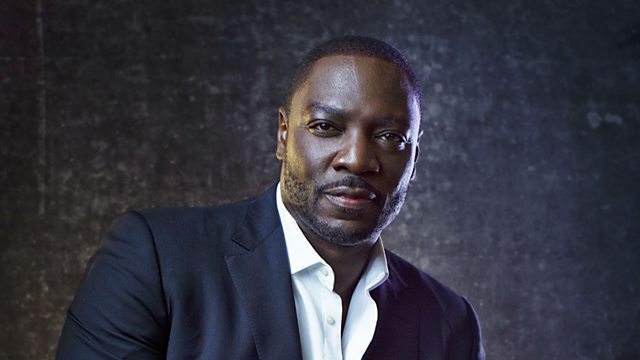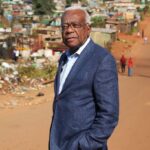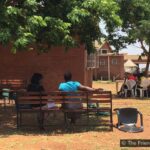The voice of Nigerian-British actor, Adewale Akinnuoye-Agbaje tells the story of how Nigerian children in the United Kingdom between the 1960s and the 1980s were ‘farmed’ out to white working class families across the country.
Adewale’s birth parents were amongst thousands who migrated to the UK in search of a better life and an education they could take back home to help build a newly independent and democratic nation.
As a result of the burdens of raising a family that awaited them on their quest. The actor’s Nigerian mother and father advertised and arranged for their children, Adewale, who was just six weeks old and his siblings to be cared for under the wing of a white family in Tilbury, a small town in Essex’s countryside in South East, England. Nigerian parents sending their children out to a foreign family was a normal occurrence though done discreetly The practice was called farming.
There, in Tilbury, Adewale was introduced to the extremes of what a black person could live through in a town that tortured people with his skin colour.
“Tilbury was very much cut off from the rest of the world. It’s very insular; composed of poor working class families,” Adewale explained.
“It was a rough town. The pubs that were the bedrock of the town; one was called The Ship and it was known to be one of the most violent pubs in Britain. Meaning the people whether sailors, the dockers or the skinheads and the locals would gather there to fight. People from other towns would also travel down just to fight there on weekends. So it was known to be a very violent town.”
Dockers can be described as the people who lived by the docks of the local port and the skinheads, were a group in the town associated with racism.
His foster mother, who cared for him dearly, saw him and the other people outside their homes as the same. But Adewale’s treatment and the threats thrown at her from her neighbours said otherwise.
“My parents fostering me, made them an object of ridicule. They were ostracised several times and I’d seen my mother confront neighbours and people that would threaten with racial slurs. We’d have things thrown at our front door.
She would always make it clear to myself and the other Nigerian children in the house that we were the same as them. But everyday we’d go out and we were shown that we were not. It was very confusing to reconcile in your little five or six-year-old mind.”
At the age of eight, Adewale’s birth parents made a surprise visit and decided to take him home to Nigeria along with his siblings.
“I remember coming home from school and seeing an African couple in the house and being told that I was going to go shopping and ended up in Lagos, Nigeria. It was a very traumatic culture shock because up until that point I had just grown up in England.
Yes, it may have been ignorant, it may have been hostile but that was the home that I knew.
In Nigeria I was considered as a foreigner and they made it very clear to me that I was an ‘akata’ which means foreigner.”

After those series of encounters, Adewale didn’t speak for up to seven to eight months of him being in Lagos. It was then that his parents realised Adewale would not be able to assimilate to Nigerian lifestyles and decided to send him back to England. But his siblings stayed.
Upon returning to England, Adewale was utterly miserable and stuck in a vulnerable position.
“I wanted to go back to the reality that I had before I went to Nigeria and it was a tough time because I knew suddenly that they are different from me and I was trying to force that out of my mind.
So I had a sort of cultural identity crisis going on at that young age that even manifested in me trying to scrub off my skin so that I could really say I’m not one of them (black people). That’s probably when the problems really started to happen.
“It was very violent and scary to be black in that area. It just wasn’t pleasant at all. The worst attack I faced was in secondary school when I was a teenager. I remember after the first assembly being beaten up and urinated on and my finger was broken. I got beaten up by the local boys in the school and a couple of them were skinheads too.
I remember walking around for the rest of the school day in clothes that smelled like damp urine, not wanting to come to school the next day.”
But his foster father stepped in and told him that unfortunately, he’d have to learn to survive the threats, the racial slurs hurled at him and the torture he constantly received from the racist neighbourhood gang, the skinheads.
The skinheads were mainly a group of white young males who had cut their head bald; hence the name and committed crimes against black people often humiliating them publicly.
Adewale decided that he would join the skinheads to gain protection and here he found his sense of belonging.
“My father from an early age pushed me out the door and told me this is how it was going to be for me and that I had to fight back. So I began to get a reputation early one for being able to take a beating and give a beating back. That began to turn into respect and when all you’ve known is humiliation, and you are suddenly noticed for something other than your colour, it becomes your lifeline. So then came this uneasy volatile alliance with them.”
And when there was a beating going down between the skinheads and another black person, Adewale joined in too.
“Absolutely, because at that time, it was for me, a young black teenage boy looking for identity and having this reputation, I had to uphold that. Because if I didn’t, they would attack me. So I would repudiate any connection with anyone that was black in the streets.
From an onlooker’s point of view it may have looked like I was being racist towards my own but from my point of view it was survival so that they didn’t attack me. It was either you’re a skinhead or a victim.
But I wasn’t the only black skinhead at the time because I remember having an altercation with one of them. It was a really curious moment because here we were, he was the leader of his own skinhead gang and there was a moment I just had to reflect ‘what was his journey to get there?’ and then in the instant of the beat, we had to fight.”
Things got worse for Adewale as he was sent to jail cells numerous times for a fight or stealing something. Luckily for him, confinement never went further than a jail cell for him as his foster mother and grandmother would frequently get him out and he was still a juvenile.
But what did change in his foster mother’s mind was that it was time Adewale left her house because he was becoming a danger to other Nigerian children at home.

So his birth parents picked him up and sent him to a private boarding school. This again was a horrible adjustment for him.
“I went from the slums of Tilbury to manicured lawns and sprinklers. I think the most challenging part was that I was suddenly immersed in a multi-cultural environment which I hadn’t been and I was afraid or would people know how I’d been before and things like that.
I recall very well when my sister gave me the local Tilbury newspaper and in there they had reported that the local Tilbury skinhead gang I was with, had been murdered one by one and their deaths were announced in the newspaper.
So I knew I couldn’t actually go back to that world.
At that point, it was just like, ‘well, how do I go forward?’ and the pressure of all of that, not having the tools, and that at age 16 when I attempted suicide, just to stop the hurt, the pain and the loneliness because I had nobody I could actually talk to about it. It didn’t work, I tried and I didn’t know how to die and I didn’t really know how to move forward.
Things only started to make sense when my Nigerian parents got some tutors, some social workers to see me regularly.
It was really the first interactions I had with black people.
They were just patient with me and they made me understand that even to survive in the streets the way I had was a form of intelligence and it was the passing of my first exam that was pivotal to me because up until that point I had always been told I was useless, I was stupid.
I realised that if I apply myself with dedication and focus, I could do something. I only got a grade C but it was the biggest achievement in my life.”
After completing secondary school at this private boarding school he graduated and got into King’s College, London to study law.
“My parents would tell you how I would stay up for 48 hours without food trying to solve a problem and I think it’s that determination to survive on the street, it was the same determination I took to books and the same that I have applied to my career. It’s like I’m saying, I’m not going to let this just whoop me.
So I pushed threw and actually flew through it too. My Masters was also something I really enjoyed because it was based on Criminology and Criminal Justice. It was very real for me because I had some intrinsic experience I could bring to it from my adolescent years.”
Adewale Akinnuoye-Agbaje later found the career of modelling at university and then later went on to become an actor. He has featured in both television series and films. Some of the are; Thor: The Dark World, Game of Thrones and Suicide Squad among many others.
He has also made a film about his young years in Tilbury called Farming which is his first directorial debut film. It has since picked up many awards and has been recognised by several film festivals including the well-known, Sundance Film Festival and the Toronto International Film Festival.














